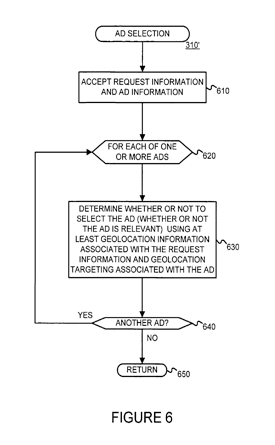
While the blogosphere was buzzing over the patent Facebook won for its news feed last week, Google earned a killer one too. The U.S. Patent and Trademark Office awarded the search giant a patent for using location in an advertising system last Tuesday, which is the emerging business model for most consumer-facing location startups today.
[aditude-amp id="flyingcarpet" targeting='{"env":"staging","page_type":"article","post_id":163964,"post_type":"story","post_chan":"none","tags":null,"ai":false,"category":"none","all_categories":"business,social,","session":"A"}']Filed six years ago, the patent is fairly broad. It covers using location for targeting, setting a minimum price bid for an ad, offering performance analytics, and modifying the content of an ad.
As we argued last week regarding Facebook’s news-feed patent, it’s uncertain whether other startups should be alarmed by this. It’s standard for large companies to file patents on technology they have developed as a defensive practice, rather than as a tool for pressuring other companies to desist or pay license fees.
AI Weekly
The must-read newsletter for AI and Big Data industry written by Khari Johnson, Kyle Wiggers, and Seth Colaner.
Included with VentureBeat Insider and VentureBeat VIP memberships.
However, the location-based ad patent may give Google a nice big stick as it goes head-to-head with Apple in the world of mobile advertising. Both companies have acquired or agreed to acquire a mobile ad network in the last three months; Google agreed to buy Admob for $750 million in November, while Apple bought Quattro Wireless in January. Google actually bucked a patent Apple owns last month, when it added multi-touch functionality to its Android operating system. Perhaps this is the card the search giant had up its sleeve.
Location-enabled search and advertising has been a major priority for Google over the past year. Last week, it started letting users refine their search by location to see results published nearby. The company’s newly-launched Buzz service also has location feeds with content that often beats out what Twitter’s geotagged tweets have to offer.
Here’s the abstract of the patent, titled “Determining and/or using location information in an ad system”:
The usefulness, and consequently the performance, of advertisements are improved by allowing businesses to better target their ads to a responsive audience. Location information is determined (or simply accepted) and used. For example, location information may be used in a relevancy determination of an ad. As another example, location information may be used in an attribute (e.g., position) arbitration. Such location information may be associated with price information, such as a maximum price bid. Such location information may be associated with ad performance information. Ad performance information may be tracked on the basis of location information. The content of an ad creative, and/or of a landing page may be selected and/or modified using location information. Finally, tools, such as user interfaces, may be provided to allow a business to enter and/or modify location information, such as location information used for targeting and location-dependent price information. The location information used to target and/or score ads may be, include, or define an area. The area may be defined by at least one geographic reference point (e.g., defined by latitude and longitude coordinates) and perhaps additional information. Thus, the area may be a circle defined by a geographic reference point and a radius, an ellipse defined by two geographic reference points and a distance sum, or a polygon defined by three or more geographic reference points, for example.
Google was also awarded six other patents last week including:
Electronic message source reputation information system
Data reconstruction from shared update log
[aditude-amp id="medium1" targeting='{"env":"staging","page_type":"article","post_id":163964,"post_type":"story","post_chan":"none","tags":null,"ai":false,"category":"none","all_categories":"business,social,","session":"A"}']
Identifying inadequate search content
Filtering search results using annotations
Pricing across keywords associated with one or more advertisements
Deconstructing electronic media stream into human recognizable portions
[aditude-amp id="medium2" targeting='{"env":"staging","page_type":"article","post_id":163964,"post_type":"story","post_chan":"none","tags":null,"ai":false,"category":"none","all_categories":"business,social,","session":"A"}']
It has also filed for these patents, published last week:
User Interface for Selecting Options
Parallel, Side-Effect Based DNS Pre-Caching
System and Method for Monitoring and Analyzing Internet Traffic
[aditude-amp id="medium3" targeting='{"env":"staging","page_type":"article","post_id":163964,"post_type":"story","post_chan":"none","tags":null,"ai":false,"category":"none","all_categories":"business,social,","session":"A"}']
Competitive Advertising Server
User Interface Gestures For Moving a Virtual Camera On A Mobile Device
Dynamic Exploration Of Electronic Maps
[aditude-amp id="medium4" targeting='{"env":"staging","page_type":"article","post_id":163964,"post_type":"story","post_chan":"none","tags":null,"ai":false,"category":"none","all_categories":"business,social,","session":"A"}']
Navigation In a Three Dimensional Environment Using An Orientation Of A Mobile Device
Anchored Navigation In A Three Dimensional Environment On A Mobile Device
VentureBeat's mission is to be a digital town square for technical decision-makers to gain knowledge about transformative enterprise technology and transact. Learn More
